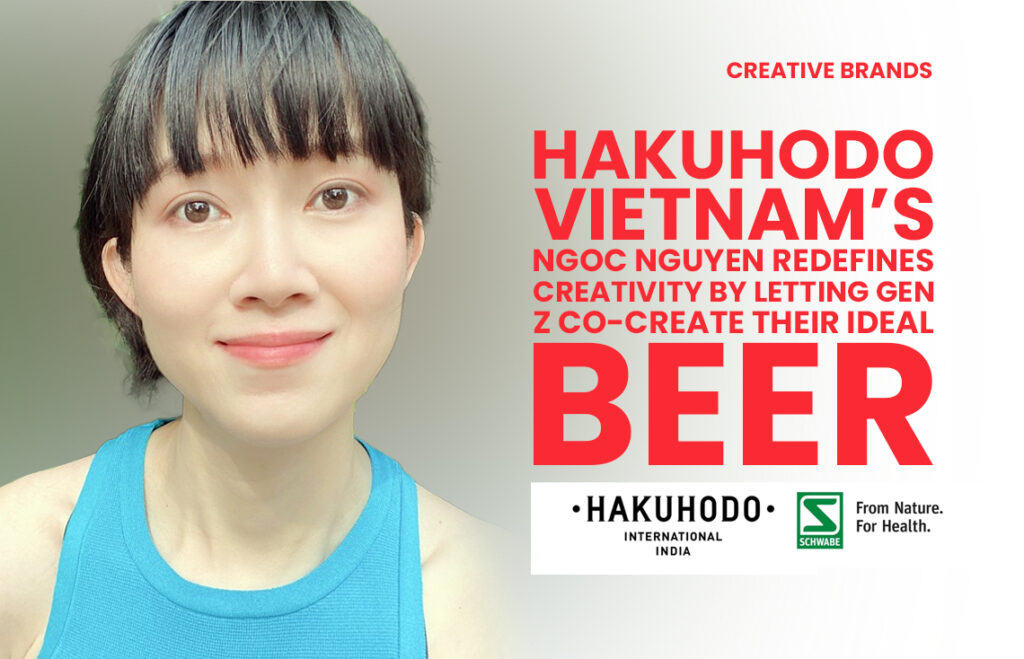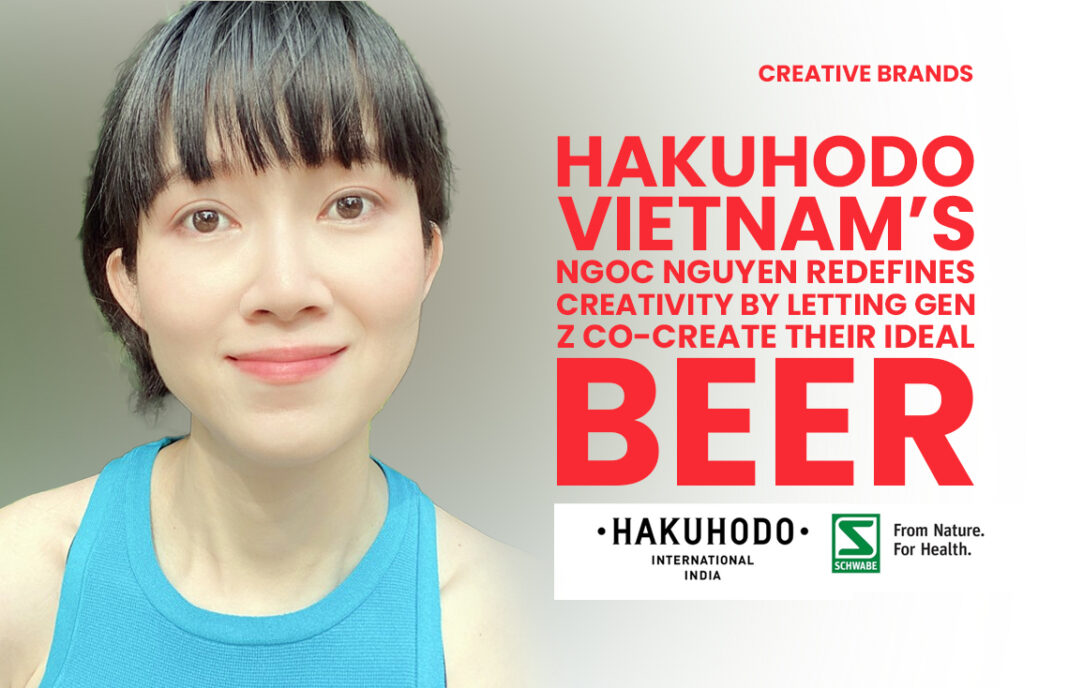Hakuhodo Vietnam’s group creative director Ngoc Nguyen is reshaping brand storytelling by inviting Gen Z to co-create Tiger Platinum beer, from flavour to packaging. Her bold, collaborative approach reflects her lifelong love of imaginative advertising and a belief that young consumers should be partners, not targets, in modern creative innovation.

Ngoc Nguyen, group creative director at Hakuhodo Vietnam, carries with her the wide-eyed wonder of a child who grew up glued to her black-and-white television, captivated by the magic of advertisements flickering on screen. That simple childhood fascination shaped her professional life — a world where imagination meets strategy, and bold ideas are not just encouraged but demanded. Today, she leads a drive toward innovation that brings Gen Z into the heart of brand co-creation, using their voices to shape not just messages but products themselves.
For Ngoc, creativity has always been more than a career — it’s a calling. She explains that her endless curiosity and desire to ‘invent, imagine and innovate every single day’ drew her into the creative world. Working at Hakuhodo Vietnam since 2020, and previously at YouNet Digital and Dentsu, she has honed her ability to turn cultural insight into powerful campaigns.
Perhaps her favorite project to date exemplifies that fusion most clearly: the launch of Tiger Platinum, a beer that didn’t simply go to market — it was built from the ground up with Gen Z. Rather than presenting a finished product, the campaign began with an invitation: “Help us craft your ideal beer.” Young people were invited into a process that most brands would guard: flavor development, packaging design, brand values. Recipes were voted on; packaging ideas debated; even the underlying ethos of the brand was up for discussion. Who usually holds the reins in a traditional campaign? The agency, the client, the creative team. Here, brewers became collaborators, and Gen Z became co-creators.
The result was telling: a beer that felt deeply of its generation. It wasn’t just marketed to Gen Z — it was shaped by them, spoken for them, and ultimately endorsed by them. For Ngoc, this wasn’t uncharted territory merely for the team, but for the broader industry. The move acknowledged that Gen Z doesn’t just consume; they participate, they demand to be heard. It transformed what a consumer-brand relationship looks like, turning passive audiences into active partners.
In this project, night owl hours were more than a quirk; they mirrored Ngoc’s creative rhythm. She openly owns her identity as a “night owl,” someone whose best thinking and energy arrives when the rest of the world is winding down — a habit she says helps her show up more fully for the people who matter in her life, and in her work.
Behind her professional drive lies a grounded sense of self. Ngoc credits her parents for their gentle guidance, recalling them as “sunshine and rainbows,” whose refusal to argue in front of their children left a lasting impression. She says the most important person in her life, though, is herself, because self-care enables her to bring her best to everyone else. “Try almost everything,” she once advised her younger self — a message echoing through her work, where experimentation, risk-taking and collaboration are not just encouraged but embedded in the process.
Food and emotion, she says with a smile, are deeply intertwined in who she is. As a Vietnamese woman, rice feels elemental — “the very foundation of my existence,” she says — and she discloses a surprising culinary quirk: she just can’t stand onions. They “make me cry. Literally.” But for Ngoc, what she can live without is as defining as what she cannot — no mystery, she says, in her preferences. When it comes to pleasure, she leans into daydreaming. That, she says, is where big ideas are born.
Her creative influences are equally rooted in the bold and the unexpected. She admires her own parents most, but professionally, she draws inspiration from work like Volvo Trucks’ ‘The Epic Split’: a stunt impossible in its scale, but delivered brilliantly with strategic muscle. It’s the kind of work that feels risky, but deeply purposeful. Ngoc’s own catchphrase, “This too shall pass,” reflects a maturity and calm that belies the restless energy of her creative life.
Her career arc is marked by a willingness to challenge norms. That willingness is not just stylistic; it’s procedural. In the Tiger Platinum campaign, tradition was turned on its head. Instead of unveiling a finished product, Hakuhodo and Ngoc invited Millennials, Gen Z and brewers into a sandbox, letting young consumers sculpt the product alongside experts. It was this unorthodox engagement that made the beer feel truly their own. That boldness — daring to invite the audience into the creative bloodstream — is central to how she thinks about her role as a creative leader.
Ngoc also believes deeply in understanding people as more than just consumers. That ethos echoes Hakuhodo’s sei-katsu-sha philosophy, which insists on viewing individuals not purely through the lens of their buying behavior, but as multifaceted people living full lives. This approach, she argues, is essential to connecting with Gen Z, whose values, behaviors and lifestyles are often misunderstood or oversimplified.
In her work, she navigates an ever-shifting cultural landscape with both sensitivity and audacity. The campaign with Tiger Platinum is not just a strategic success; it’s a cultural one — a reminder that the future of brand-building lies not in speaking at people, but with them. By lifting Gen Z into co-creation, Ngoc has shown that young audiences don’t just want to be marketed to: they want to be architects of their own experiences.
That philosophy not only guides her work, but resonates in how she lives. She nurtures her mind and body so that she’s fully present for both her team and her loved ones. In a profession that demands constant innovation, she protects space for reflection, dreaming, and rest — even if it comes late at night. Her story is one of reconciling contrasts: the pragmatic and the visionary, structure and play, leadership and listening.
Ngoc Nguyen’s journey from a child watching black-and-white TV commercials to leading a creative revolution at Hakuhodo Vietnam is not merely a personal arc. It is emblematic of a shift in advertising itself — one where audiences are not just targets but collaborators, where creativity thrives in openness, and where brands are shaped with, not just for, the people they serve. In turning Gen Z from consumers into co-creators, she has helped define what relevance means in the 21st century — and in doing so, has shown that the most powerful ads start not with a brief, but with a question: What do you want?







